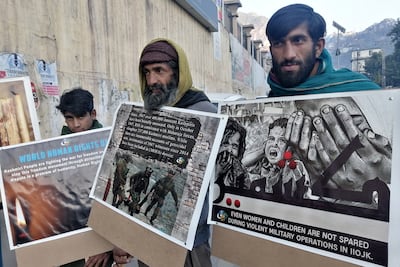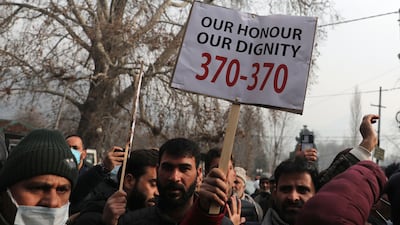India’s Supreme Court said on Tuesday it will hear 23 petitions challenging the government’s contentious move in 2019 to annul the semi-autonomous status of the disputed Jammu and Kashmir region.
Jammu and Kashmir – the Himalayan disputed territory claimed by both India and Pakistan – was granted special status under the Indian constitution's Article 370.
But in August 2019, the government of Prime Minister Narendra Modi’s Bharatiya Janata Party revoked the special status, bringing the region under its direct control, with the party saying the decision corrected a “historical blunder”.
Tens of thousands of additional troops were deployed in the world’s most militarised region as a months-long security and communication lockdown was imposed in the state to stop protests.
As many as 23 petitions have been filed by lawyers, activists, journalists, politicians and retired civil servants to the top court challenging the government’s move.
The court held an initial hearing in 2020, referring the case to a five-member constitutional bench, with no dates announced for the hearing.
Last week, a five-judge constitution bench, headed by Chief Justice of India Dhananjaya Yeshwant Chandrachud listed the case for further hearing.
The bench on Tuesday said that all parties have to file all documents, compilations and written submissions by July 27.
It said the hearing would begin on August 2, with cases heard daily excluding Mondays and Fridays, the order said.
The petitioners have also challenged the proclamation of the president’s rule in the state in December 2018 after the BJP withdrew its support from the alliance government in the state, following which the assembly was dissolved.
Former military officers and bureaucrats have also challenged the presidential order, which repealed Article 370.
Article 370
Following the withdrawal of British colonisers from the Indian subcontinent and the partition of British India into India and Pakistan in 1947, all princely states were asked to join either of the dominions.
Kashmir’s Hindu ruler Maharaja Hari Singh decided to keep the Muslim-majority region independent, but he was forced to accede to India following a mutiny and later a war between India and Pakistan.
Both nations have since been ruling it in parts, but claim in its entirety while fighting two more wars over the decades.

New Delhi pledged to grant the region special autonomy, leading to the framing of Article 370 in the Indian constitution, including a provision that the special status can be amended only in consultation with Kashmir’s parliament.
It allowed Kashmir to have its own constitution, a separate flag and freedom to make laws while leaving defence, foreign affairs and communications with central government.
This meant that the state had its own rules relating to permanent residency, ownership of property and fundamental rights. No non-Kashmiri could buy land or property in the region, to mainly safeguard the region’s unique demography.
Revocation and challenges
Kashmir is the only Muslim-dominated region in the Hindu-majority India.
The region has been wracked by violence since 1989 after armed groups launched an anti-India campaign in Kashmir.
The ruling Hindu nationalist BJP has often found electoral gains in the sectarian divide in the diverse nation, and Kashmir has remained at the centre of its muscular policy with Islamabad, as well as a source of domestic Hindu votes.
Mr Modi’s government has argued the revocation of autonomy to Kashmir has helped the region integrate better with New Delhi and end the armed rebellion that it calls terrorism.
On August 5, 2019, months after Mr Modi returned to power with a thumping majority for his second term, his government stunned the country after it scrapped the provision.

Locals and critics of the government have argued that the move was unconstitutional under Article 370, which states any decision related to the autonomy of the state would be taken by the Constituent Assembly – a body of representatives elected in 1951 to formulate the constitution of Jammu and Kashmir.
The parliament would have needed the recommendation of the Constituent Assembly to modify the article.
However, the government’s actions were taken without any consultation with the Constituent Assembly as it was dissolved on January 26 1957.
In the absence of the Constituent Assembly, the president of India in his order in August 2019 allowed Mr Modi’s government to amend the article after amending the term “Constituent Assembly” to be read as “Legislative Assembly of the State”.
The order also amended the term “Government of J & K” to be read as “Governor of J & K”.
Because the legislative assembly was already dissolved in 2018, it became easier for the central government to not consult legislators over the move. Instead, it passed a resolution in parliament recommending the repeal of Article 370.


